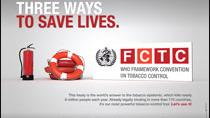KABUL - On World No Tobacco Day (31 May), the World Health Organization celebrates the successes of the WHO Framework Convention on Tobacco Control in the fight against the epidemic of tobacco use.
Since it was adopted by the World Health Assembly in 2003, 172 countries have become Parties to the WHO Framework Convention on Tobacco Control. Afghanistan signed the treaty on 29 June 2004 and, under the leadership of the Ministry of Public Health, ratified and became a party of the Convention on 13 August 2010.
Afghanistan has then started moving towards full treaty enforcement and compliance by drafting its first laws to control smoking. The final draft has been submitted for a review to the Ministry of Justice and, according to the WHO Framework Convention on Tobacco Control obligations, it suggests to:
protect people from exposure to tobacco smoke,
ban tobacco advertising and sales to minors,
put large health warnings on packages of tobacco,
ban or limit additives to tobacco products, and
increase tobacco taxes in Afghanistan.
"Tobacco is the second major cause of death in the world. It is currently responsible for the death of 1/10 adults worldwide, nearly 6 million people, including some 600 000 nonsmokers who will die from exposure to tobacco smoke. By 2030, it could kill 8 million," says Dr Ahmed Shadoul, WHO Representative in Afghanistan.
Tobacco use is one of the biggest contributors to the epidemic of noncommunicable diseases – such as heart attack, stroke, cancer and emphysema – which accounts for 63% of all deaths, nearly 80% of which occur in low- and middle-income countries. Up to half of all tobacco users, that is about 650 million people, will eventually die of a tobacco-related disease.
"Full implementation and enforcement of, and compliance with, the Convention is vital to decreasing the considerable health and economic burden caused by tobacco," says Dr Hussein A. Gezairy, WHO Regional Director for the Eastern Mediterranean.
Many of the countries in the Eastern Mediterranean Region have made tremendous strides in implementing the treaty.
"The tool for a tobacco-free world is at our fingertips," says Dr Gezairy. "Tobacco control cannot and will not advance to the next level unless all partners work together towards this common goal."
Where technical and funding gaps exist, Parties must gather the necessary resources, with the essential help of the international community. WHO offers technical assistance and policy guidance to its Member States to help them meet their commitments under the treaty.
"The Framework Convention has proved to be more than just an ordinary convention. It has fulfilled its promise, creating a whole new public health era for tobacco control," says Dr Gezairy. "Its provisions have been trialled, tested and proved effective in many countries, globally and regionally. With the WHO Framework Convention on Tobacco Control, we stand the biggest chance of achieving what could be the single largest positive impact on health in this century."
WHO’s Framework Convention on Tobacco Control
The Framework Convention was developed in response to the globalization of the tobacco epidemic. It represents a milestone for the promotion of public health and provides new legal dimensions for international health cooperation. The Convention contains core demand and supply reduction measures that:
• reaffirm the right of all people to the highest standard of health;
• hinder the tobacco industry’s efforts to affect the health policies that are designed to protect people from tobacco; • call for enhanced international cooperation to protect present and future generations from the devastating health, social, environmental and economic consequences of tobacco consumption and exposure to second-hand smoke.
Related links
WHO’s Framework Convention on Tobacco Control: www.who.int/fctc
WHO’s Tobacco Free Initiative: www.emro.who.int/tfi/tfi.htm
For more information, please contact:
Liisa Keates, Communications and External Relations, WHO Afghanistan
Tel: +93 702217730, Email: keatesl@afg.emro.who.int
Dr Adela Mubasher, National Professional Officer, Tobacco Control, WHO Afghanistan,
Tel: +93 700281127, Email: mubashera@afg.emro.who.int
Dr Fatimah El Awa, Regional Adviser, Tobacco Free Initiative, WHO Regional Office for the Eastern Mediterranean, Tel: + 202 22765272/562, Email: TFI@emro.who.int






